Story by John D. Sutter, CNN Investigates
Video by Ed Lavandera and Jason Morris, CNN
Additional reporting by Cristian Arroyo for CNN
Photographs by Jayme Gershen for CNN
Kissimmee, Florida (CNN))-With no running water, no power and no school for her kids, Carmen “Millie” Santiago fled Puerto Rico after Hurricane Maria hit the Caribbean last fall. Like thousands of evacuees, she landed here in central Florida. And, like hundreds, she’s still stuck in a motel.
Seven months after the storm, the quick-witted 50-year-old with chestnut hair and a warm smile has become the de facto mayor of “El Super Ocho,” or Super 8, the beige motel in the shadow of Disney World where she lives with her husband and two children. She keeps business cards of apartment managers, case workers and potential employers spread out on a table by the motel room door — anything that might help her neighbors figure out how to survive the complex and increasingly eternal limbo they find themselves in.
This week, hundreds of evacuees were told they would be booted from the motels where they’ve lived rent-free on assistance from the Federal Emergency Management Agency, or FEMA. On Friday at 1 p.m., after mounting pressure from members of Congress, Puerto Rico’s governor and evacuees like Millie, as well as multiple inquiries from CNN, FEMA announced it would extend the motel assistance for Maria survivors until May 14.
Millie and others didn’t know where they would have gone without the extension. And after what one advocate described as a week of panic, they still don’t know what will happen next month.
She does know what happens to evacuees who lose the motel vouchers, though: There’s the mother of two who says she slept several nights in a car after FEMA’s motel-room assistance ran out in March. There’s the family of eight — four children, their parents and grandparents — who slept together in a motel room with only two beds. In that room on a recent day, a 7-year-old girl ate spaghetti for lunch using the end of a plastic coat hanger as a utensil.
Some families say they’ve relocated four, five and six times to avoid sleeping on the streets.
Meanwhile, shelters near Kissimmee, the southern suburb of Orlando that’s come to be known as “Puerto Rico north,” are full. Low-income housing is unavailable. Rents are out of reach. Non-profits have been sapped of resources. And federal aid for the evacuees either is running out or was never offered.
At issue are two FEMA housing programs. One, called the Transitional Shelter Assistance program, pays motel bills for people whose homes were damaged in Puerto Rico, even if the disaster victims left the island. That program, according to FEMA documents, was designed to be used for about two weeks. It has been extended repeatedly. More than 1,200 cases in the 50 states had been determined by FEMA to be ineligible for continued assistance after this week, according to documents provided to CNN, with about half of those cases in Florida.
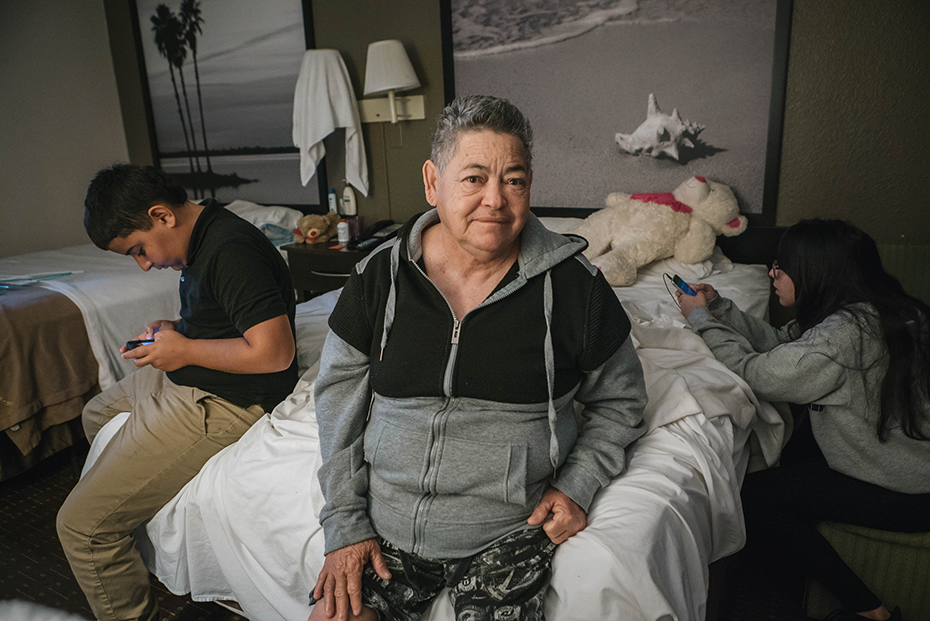
In a letter to FEMA on Wednesday, Carlos Mercader, executive director of the Puerto Rico Federal Affairs Administration, requested an “unconditional extension” of the motel program.
“It is vital that FEMA approve this request immediately so that countless Puerto Rican families, who have lost everything as a result of this catastrophic disaster, are not once again uprooted in a chaotic fashion,” he wrote. “If FEMA does not approve the (Puerto Rico) government’s request, students currently finishing the school year in the mainland will be deprived of their education, as well as their housing.
“It’s not clear whether FEMA will decide to extend the program beyond May 14.
The federal agency contests the assertion that it would put people out on the street by ending their assistance. The Transition Shelter Assistance program is meant to provide emergency housing in the immediate aftermath of a disaster. It is “tragic” so many families have had to continue to live in motels for months without other viable housing options, said Mike Byrne, FEMA’s federal coordinating officer for Puerto Rico, in an interview with CNN last week.
“There comes a point when these problems are no longer really disaster problems but are social problems,” Byrne said. “The idea that we’re throwing people on the street — there’s no accuracy, there’s no truth to that type of thing.
“We are doing everything we can to help these people,” Byrne said, “but if their home is fixed, or they have the ability to stay with family or friends … and they choose that they don’t want to go back (to Puerto Rico), then, quite frankly, they fall out of this program” offering motel rental assistance.
“They’ve made a decision not to use the assistance that we’ve provided,” he said. “That’s their decision. And this is a free country.
“Applicants can lose the FEMA motel vouchers if their homes in Puerto Rico are found to be livable, after inspection; or if FEMA finds they have other viable housing options, such as friends they could live with, among other requirements, said Byrne.
Those restrictions were at least temporarily lifted to allow disaster victims to keep getting assistance until next month. Evacuees should contact FEMA if they believe their case was handled unfairly, Byrne said, and individual aid may be extended beyond May 14 if warranted.
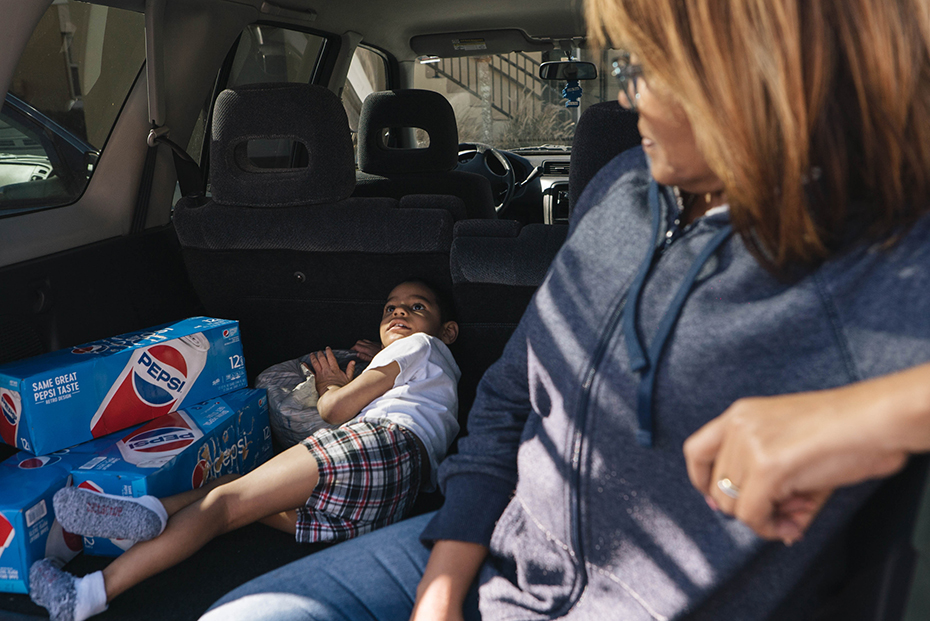
Transitional Shelter Assistance isn’t the only FEMA program stirring controversy, however.
Another FEMA program, called Direct Lease, could pay for longer-term rentals, which advocates say would be more humane and prevent homelessness among evacuees. That FEMA housing program, however, has not been made available to Hurricane Maria evacuees living in Florida or other US states.
FEMA is offering that assistance only to evacuees who return to Puerto Rico, or to people who never left the island. FEMA will go so far as to pay for a person’s flight back to the Caribbean island, Byrne said. No one has taken the agency up on that offer yet, he said.
Asked why the Direct Lease program is not offered in Florida, Byrne at first said that he believed Puerto Rico Gov. Ricardo Rosselló had not requested it.
CNN, however, obtained a January 31 letter to FEMA from a member of the Rosselló administration requesting Direct Lease assistance for “eligible evacuees from Puerto Rico not only here on the island, but also for those located across the United States.
“In response, Byrne said it would not be prudent to provide long-term lease payments for people living in Florida rather than in the territory directly hit by the disaster. In his lengthy career, which has included working on the response to Superstorm Sandy and other emergencies, FEMA had never provided long-term housing in that way, he said.
“The reason they are eligible (for FEMA assistance) is because they had a home in Puerto Rico. And so we’re going to provide the option of a home in Puerto Rico,” he said.
Meaning: Not in Florida.
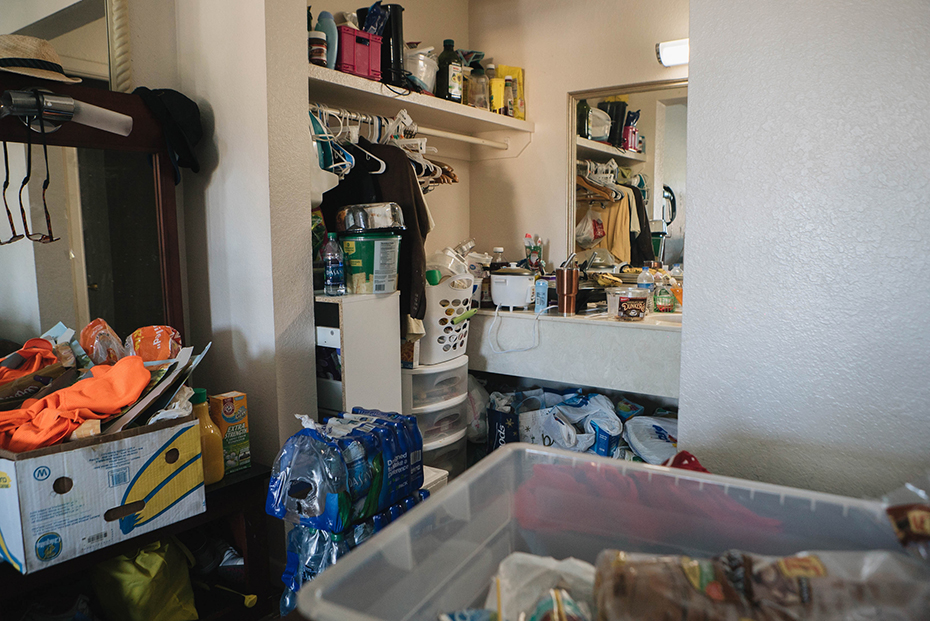
In the void, at least in part, there’s Millie. She receives many of the evacuees’ tearful phone calls. They knock on her motel door late at night. She tries to counsel her neighbors and new friends as they are evicted and struggle to find affordable housing — a process some evacuees described as so stressful it had induced panic attacks. And she coordinates with community advocates and aid organizations.
In short: She’s trying to help others before herself.
“The captain is always the last to leave the ship,” she said.
Researchers fear an ‘exodus’ from Puerto Rico
Central Florida long has been a destination for Puerto Ricans. The island is a US commonwealth home to 3.3 million American citizens, and residents can move freely to the 50 states without visas or other documentation.
New York once was seen as the mecca for Puerto Rico outmigration. It’s been eclipsed more recently by Florida, in part because of the warm climate that’s more similar to Puerto Rico and also because of what community advocates call the “Disney Dream” — a fairy-tale vision of Orlando and its theme parks.
Puerto Rico was suffering a massive and unprecedented population loss before Hurricane Maria hit, largely because of a debt crisis that bankrupted the island’s government and crippled the economy. After Maria, some demographers told CNN they feared an “exodus” lasting many years, with repercussions for Puerto Rico and for host communities on the mainland.
As CNN reported in February, Florida particulary the Orlando- Kissimmee area appears to be the top destination for Maria evacuees. That assessment is based on a review of FEMA disaster assistance data and US Postal Service change-of-address requests from Puerto Rico.
While it’s impossible to say exactly how many people fled the island after the storm, estimates range from thousands to more than 100,000. In Florida alone, the state’s department of education told CNN this week that nearly 12,000 new students from Puerto Rico have enrolled in public schools in the months since Hurricane Maria. The two top school districts for enrollees in Florida were Orange County, which includes Orlando, and Osceola County, which is home to Kissimmee.
Evacuees are arriving to find that Orlando and Kissimmee offer anything but the “Disney Dream” they imagined — or that they saw on vacations and heard about from relatives.
Like many cities in the United States, Orlando and Kissimmee suffer from a crippling affordable-housing shortage, making it difficult if not impossible for evacuees to find stable housing outside of motels. A March report from the National Low Income Housing Coalition named Orlando- Kissimmee- Sanford the third worst large metro area in the nation in terms of affordable housing availability. For every 100 renters needing low-income housing, the report said, only 17 units are available.
Government housing programs are not meeting needs, either. The Orlando Housing Authority told CNN it had 18 units — total — available when the storm hit. Neither that housing authority nor Osceola County, which includes Kissimmee, had any new and available Section 8 vouchers that could be used by evacuees. Those vouchers let recipients search for subsidized housing. Only evacuees who brought Section 8 vouchers from Puerto Rico could qualify to transfer those vouchers, according to Vivian Bryant, president and CEO of the Orlando Housing Authority.
“We haven’t received a new allocation of Section 8 vouchers,” Bryant said. “We are 101% leased up. We don’t even have anything we can offer anybody.”
Non-profits and churches are strained, too.
There are currently no open shelter beds for homeless people in the Orlando metro area, said Martha Are, executive director of the Homeless Services Network of Central Florida. Additionally, the one shelter that serves homeless people in Osceola County, where many evacuees live along US Highway 192, takes only domestic-violence victims, she said.
So if evacuees came to a shelter after getting kicked off the FEMA motel program, would they be turned away? CNN asked.
“That’s right,” she said.
With federal help lacking, the financial burden of helping Maria evacuees in Florida is falling — and falling hard — on churches and non-profits, said Rev. Jose Rodriguez, from Iglesia Episcopal Jesus de Nazaret in Orlando. His congregation had been helping pay the rent of some Puerto Rico evacuees who lost or were not granted FEMA motel assistance, he said. But in mid-April the church had run out of grant money and donations, he said, and would have to stop assisting evacuees at least temporarily. In his view, FEMA is leaning too much on goodwill.
“They’re homeless. They’re couch surfing,” he said of evacuees.
Programs that should be helping them transition to a stable life in Florida are “failing them,” he said.
Sociologists have documented what they call “disaster fatigue” that sets in months after an event like Hurricane Maria. People who may have been inclined to donate to Puerto Rico immediately after the September storm may not realize, or care, that needs continue so many months later, both on and off the island. Advocates in Florida worry that this fatigue may be without remedy.
Meanwhile, the influx of Puerto Rican evacuees is expected to continue. Thousands of homes on the island have not had power in seven months. Just this week, the entire island was temporarily without electricity in a major blackout.
Eight people, two beds, one motel room
At dawn, the kids walk out of motels to bus stops on a highway.
Some are the children of Maria. Their homes were damaged or destroyed when the September hurricane smashed into Puerto Rico; they were left without power or running water, often both, for months; their parents were left jobless, or without clear job prospects on the island; and many of their schools were closed.
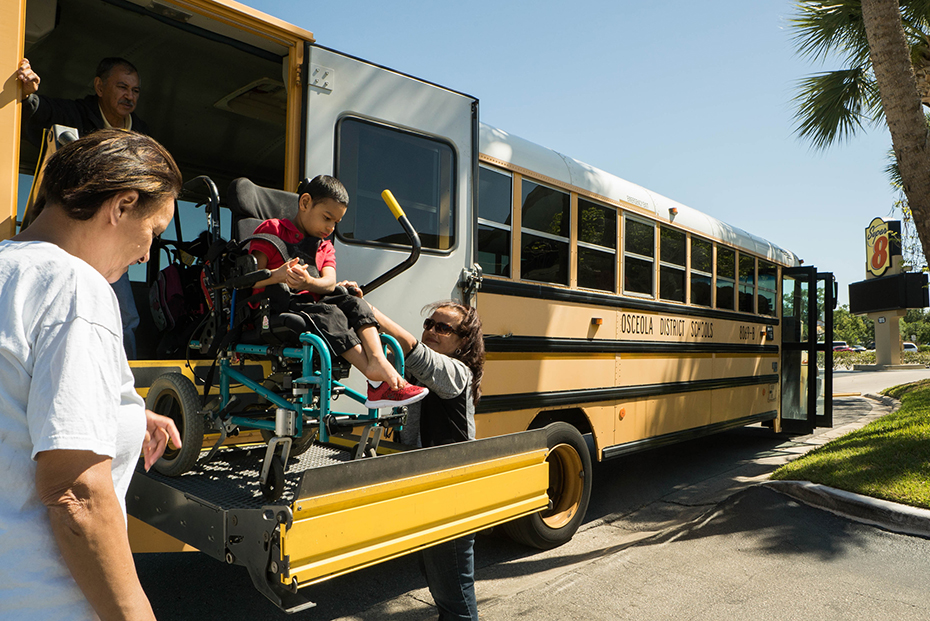
In short: They fled for a safer, better life.
Florida said they were welcome.
“As Puerto Rico rebuilds, Florida remains committed to doing everything we can to help the families impacted by Hurricane Maria and aid in the recovery process,” Gov. Rick Scott said in a statement issued October 2, the same day Florida declared a state of emergency in reference to the arrival of Puerto Rican migrants.
Millie, the “mayor” of the Super 8 in Kissimmee, said she heard via social media that Florida planned to welcome evacuees and help them enroll in schools. She ran a day care — named “El Palacio de los Niños,” or The Children’s Palace — in Carolina, a town not far from San Juan. She needed to find a personal generator to keep it operational. She came to Florida, she said, to enroll her kids in school and to sort out how to reopen her business. Later, however, inspectors closed the daycare because of her absence and because the facility lacked power and running water, she said. That’s when she decided to stay here.
Perhaps it’s her experience with that daycare — the parents of her students still send her photos from Puerto Rico; she misses the kids dearly — that prepared her for the role of caring for evacuees.
With so many people in need, she felt like she had to help.
She does so joyfully, laughing as often as she cries.
Still, it wears on her.
Asked if there were some evacuees she hadn’t been able to help adequately, she responded:
“All of them.”
CNN interviewed more than a dozen evacuees in the Orlando and Tampa metro areas. Few expressed any desire to return to Puerto Rico. And despite the difficulties they’ve had adjusting to motel life, many were grateful to FEMA, charitable organizations and family members who had given them places to stay.
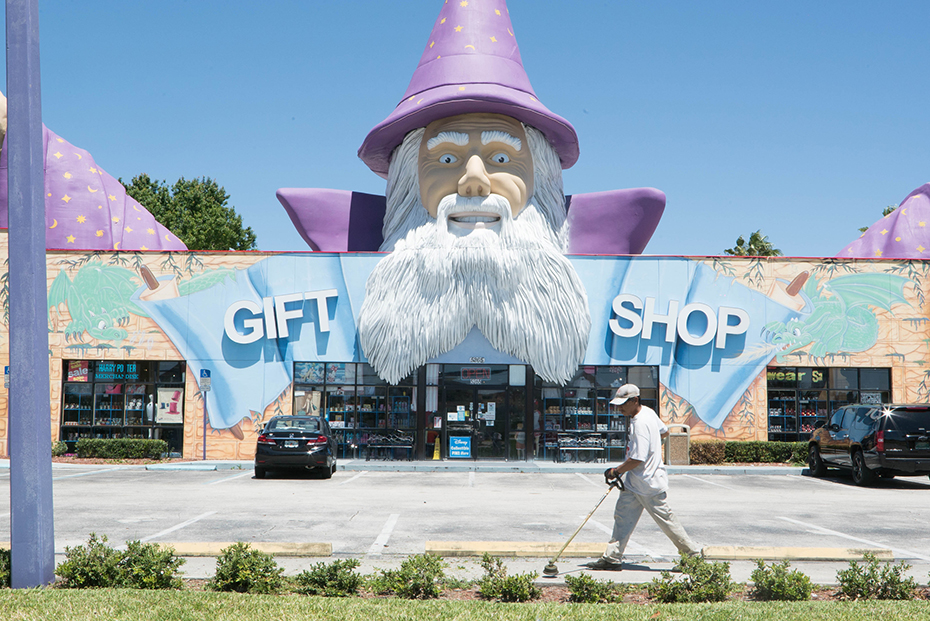
Dacny L. Quintero Segarra talked about the situation on the walkway outside her motel room in the Baymont Inn and Suites on US Highway 192 in Kissimmee — a stretch of road, also known as Vine Street, that’s home to at least 10 motels listed by FEMA as accepting motel vouchers. She had a Walmart bag tied over her hair. Beneath it, she had applied an ointment, she said, to stop the rest of her hair from falling out.
She attributes the problem to stress.
“I feel like this is Narnia,” she said — like everything is turned around.”
The housing situation is very, very, very bad,” she said. “Everything is a ‘no.’ They say they’re going to help you but we’ve only helped each other — Puerto Ricans banding together. I’m not interested in material things. All I want is shelter for my kids.”
Quintero told CNN that FEMA offered her a free flight back to Puerto Rico.
“If I tell them I want to go back to Puerto Rico, they would say, ‘Here’s the money, buy your tickets.’ But it’s not just that. I want to live here,” she said, primarily because there are jobs and schools.
Downstairs, her parents, Alfredo Quintero and Dacny Segarra, who goes by the same name as her daughter, live in a room with wide doors to accommodate Alfredo’s wheelchair. The elder Dacny said she had stopped taking medicine she needs to prevent blood clots because she has no health insurance in Florida and can’t afford the pills without it.
She said she was hospitalized in Florida because of blood clots in her legs.
The older couple was told this week that they would lose FEMA assistance after April 20. That was before FEMA announced the extension into May — an announcement that came the day before their scheduled eviction.
Carlos Lara Santos, who is raising a baby girl, Valentina, born on April 2, already knew he’d get to stay until May 14, he told CNN. The family is living in the Super 8 with seven children, including the newborn. “If you have a home, it’s comfortable, the conditions are better,” he said. “If you have to raise a child in a hotel room, it’s not the same.”
Without FEMA assistance, some families end up in a cycle of motel eviction and debt. Liza Hernandez had been living in a two-bedroom unit at the Super 8 in Kissimmee with seven of her relatives. Initially, the family got help with hotel fees from FEMA, she said, but that ran out. They were able to start paying for the Super 8 on their own because three of the eight family members work. Then the hotel rate went up to $113.40 per night. The family fled to the Unno Boutique Hotel — $50.22 per night. There, all eight were crammed into one room with two beds. They haven’t been able to find an apartment, she said.
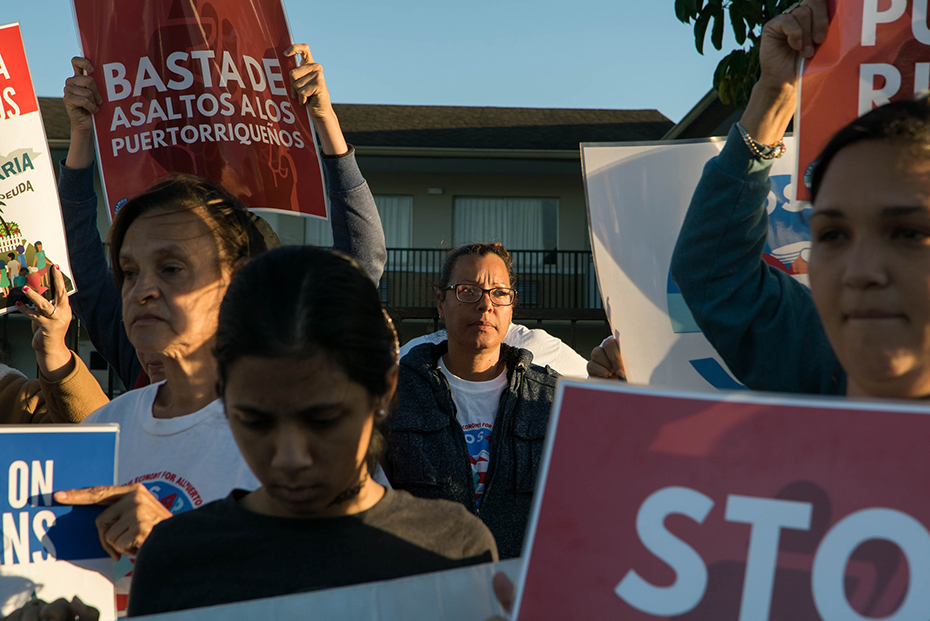
At the other end of the highway, near a gift shop shaped like a massive orange — “Welcome to Florida: Take Some Home” — and another shop shaped like a wizard, Yamil Rodriguez was staying in a Holiday Inn. He said he had been putting the room on a credit card, and the hotel staff had been nice enough not to run the charge. He knew it wouldn’t last, though.
“I’m waiting for a miracle,” he said.
On April 9, he sent a panicked message to a reporter.
“I’m on the street right now.”
Rodriguez landed in another motel later that night.
He and several other evacuees expressed gratitude toward the hotels that have housed them these past months. Many know the names of their housekeepers and greet them with hugs. Rodriguez said the Holiday Inn was kind to let the family stay as long as it did.
Some Maria migrants know friends or family members in Florida and stay with them — at least for a time. “There’s a saying in Spanish: ‘After three days, the dead start to smell,” said Julio, 53, who had been living, along with his wife and five of his six children, with a niece near Tampa. “The house is getting small.”
The landlord threatened to evict all of them on April 15, including the niece, if Julio and his family didn’t move elsewhere, he said. By April 19, he’d moved to Jacksonville to live with his adult son and to look for work. The place is too small for all of them, he said, so his wife and five kids are still living with the niece in secret. “It’s like they’re hiding out,” he said. (CNN is not using Julio’s last name in order to protect the family.)
Julio expected to start work through a job placement service later this week.
He hopes to save up enough money so they might get their own place — eventually.
“Thank God we’re alive, you know, so we can continue on this journey,” Julio said.
Still, this sort of uncertainty can be exhausting — and potentially dangerous.
Melissa, a young mother of three, said her home in Puerto Rico was so damaged that she initially slept on the floor of her mother-in-law’s house on the island. That situation became untenable so she decided to come to Florida. She didn’t know anyone here well enough to ask for a place to stay, she said, so she slept in the airport in Orlando. (The Florida governor ordered welcome centers be established in major airports in the state; Melissa, whose full name CNN is withholding to protect the privacy of her children, said she did not see the welcome center in Orlando).
In total, her family has lived in six locations since Hurricane Maria, she said.
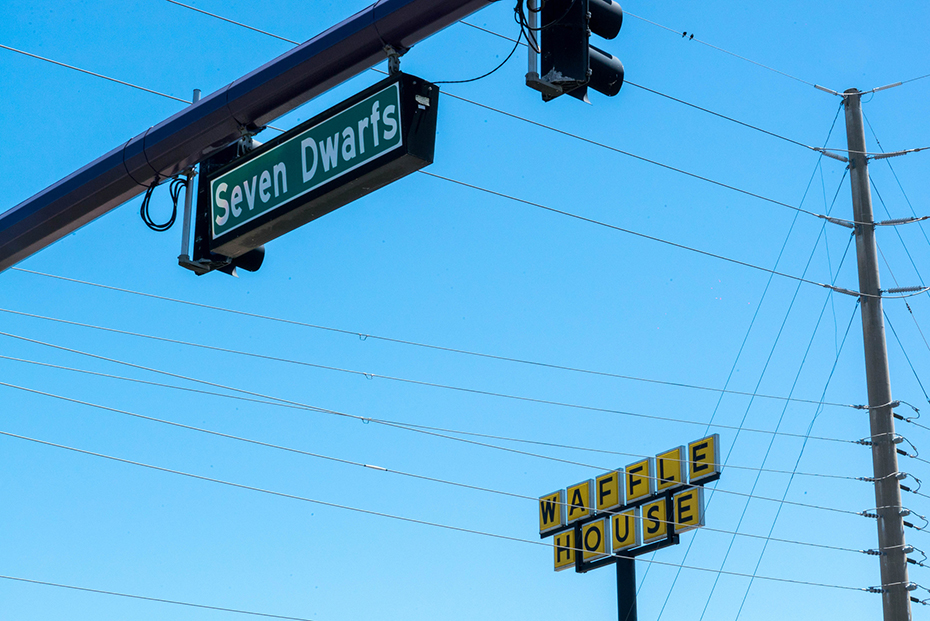
In March, when she lost FEMA motel assistance, she and her husband slept in their cars with their children, ages 4 and 9, for three nights.
“FEMA just told me, ‘Call the Red Cross or look for a shelter,'” she said.
FEMA declined to comment on individual circumstances, citing privacy laws.
Melissa posted a praying-hands emoji and a cryptic plea for help on her Facebook page. A friend responded with a temporary place to stay. She wore out her welcome before ending up back in motels. Now the family is paying $500 per month, she said, to rent a single bedroom in a house. She’s not sure how long that will last, but it’s better than paying weekly motel fees.
“I’m really thankful for the help we’ve gotten,” said Melissa. “They gave me jackets and blankets and supplies. The school treated us well.
“But FEMA? When there are children, you can’t let people sleep on the street. It’s not the same for an adult to be on the street as for kids to be.”
‘This could have been done far more humanely’
Disaster experts, community advocates and Democratic politicians are similarly critical.
The longer children live in motels the more likely they are to be exposed to “toxic stress” that can contribute to long-term problems in school and mental health issues, said Dr. Irwin Redlener, director of the National Center for Disaster Preparedness at Columbia University in New York.
“It is an extremely urgent matter to get these families with their children into a stable situation that is predictable and reestablish a sense of routine,” he said.
Redlener said motels don’t do that.
“It’s an extremely makeshift, temporary answer to a very complex problem,” he said. “It doesn’t work for long, living in a motel, especially a crowded motel. It is a terrible situation for a young child.”
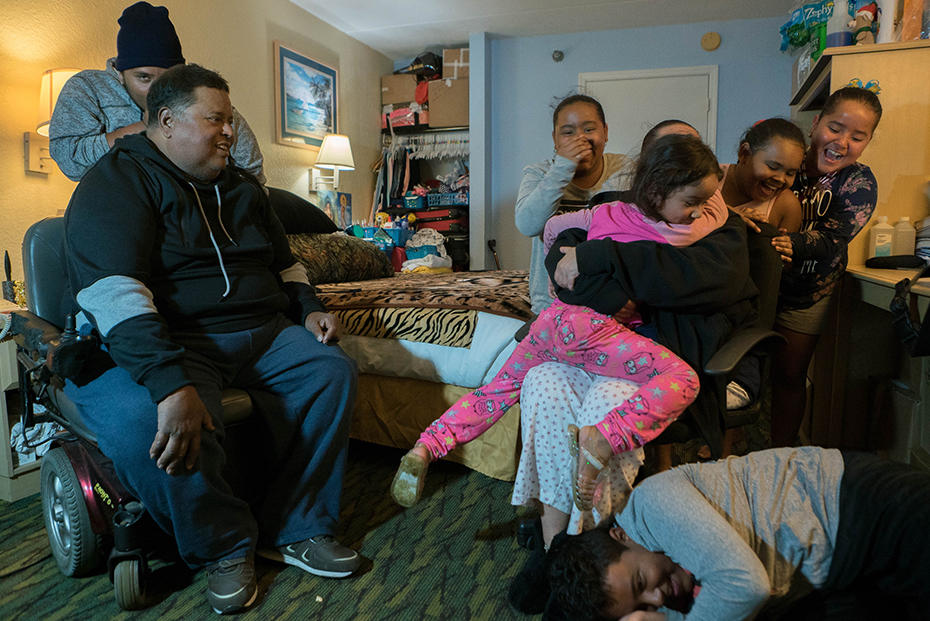
People who flee disasters often think they will be able to escape trauma by relocating, he said, but that rarely proves to be the case. The hurricane follows them. The best way to help disaster survivors recover, he said, is to provide longer-term apartment housing.
FEMA does offer a “Rental Assistance” program for hurricane victims, both in Puerto Rico and in the 50 states. The agency has allocated $121 million to that effort, but officials told CNN they were unable to say how many recipients of that assistance were living in the states versus Puerto Rico.
The program provides disaster survivors with a monthly rental payment for up to 18 months, depending on eligibility. That payment, however, according to a FEMA spokesperson, is based on the rental market in the community where the person lived at the time of the disaster, not where they are currently living.
That means a person who fled Puerto Rico for Florida would get paid a rental stipend based on the rental market in Puerto Rico, the spokesperson said, not that of Florida, which is far more expensive. The fair market rent for a two-bedroom apartment in San Juan, Puerto Rico, is $530 per month, according to a US Department of Housing and Urban Development index. In Osceola County, Florida, it’s $1,096 — more than double.
Those amounts can be adjusted depending on family circumstances and other factors.
As for the Transitional Shelter Assistance program, more than 7,000 applicants have gotten motel vouchers as part of the Hurricane Maria recovery, according to FEMA. About 2,700 applicants still were staying in motels as of mid-April, nearly seven months later, according to Byrne, the FEMA official in Puerto Rico. Nearly 40% of those current residents are in Florida.
In all, FEMA has spent $64.4 million on the motel program for Maria victims.
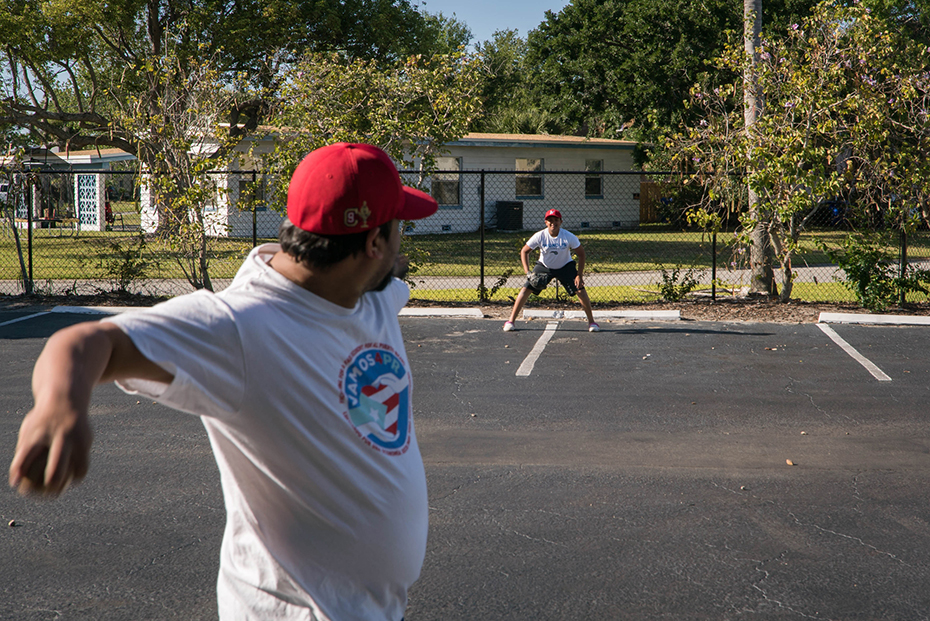
“Just like a shelter is not intended to be a long-term solution for somebody, a hotel room … was never intended to be a long-term solution,” said Byrne, the FEMA official. “What we work hard at is to provide overarching case management to these families … to help them find a way back into their home (in Puerto Rico).
“He added, “I don’t think anybody wants to stay in a hotel. … It gets old fast. Imagine if you had your whole family with you in a one-room hotel. We want to try to find another solution for those people (who are still living in hotels) as quickly as possible.”
Without more transitional help, however, hurricane victims “fall off a cliff” when they’re booted from motels, said Rodriguez, the Episcopal priest in Orlando. “Stop kicking this can down the road and just give them permanent housing,” he said. “There needs to be a game plan. It’s a waste of taxpayer money to be dumping money into hotel stays.”
The whiplash of the threatened voucher cutoffs and last-minute extensions causes unnecessary turmoil for disaster survivors, he said. “We have three weeks for people to find homes,” he said, referring to the May 14 FEMA cutoff. “They lost a week in panic, now we have three weeks to find them homes. How are we going to house over 1,000 people?”
“We still have these families who are going to have to vacate before the end of the school year,” he added.
The fact that the Direct Lease program — which can provide housing for 18 months or sometimes longer — is offered in Puerto Rico, but not in Florida, has been criticized by US Rep. Darren Soto, a Democrat who represents Kissimmee and central Florida.
“This could have been done far more humanely if the Trump administration would have approved long-term lease vouchers,” Soto told CNN. “It would have allowed these people to save up enough money for a deposit and live in a far more humane environment.”
It’s not a priority for the White House to have these (longer-term housing programs) approved,” Soto said. “Otherwise it easily would have been done.”
FEMA officials have said repeatedly that they’re handling Hurricane Maria’s recovery as they would any other storm of this magnitude, regardless of the fact that Puerto Rico is not a US state, does not have voting members in the US Congress — and that its residents can’t vote for president.
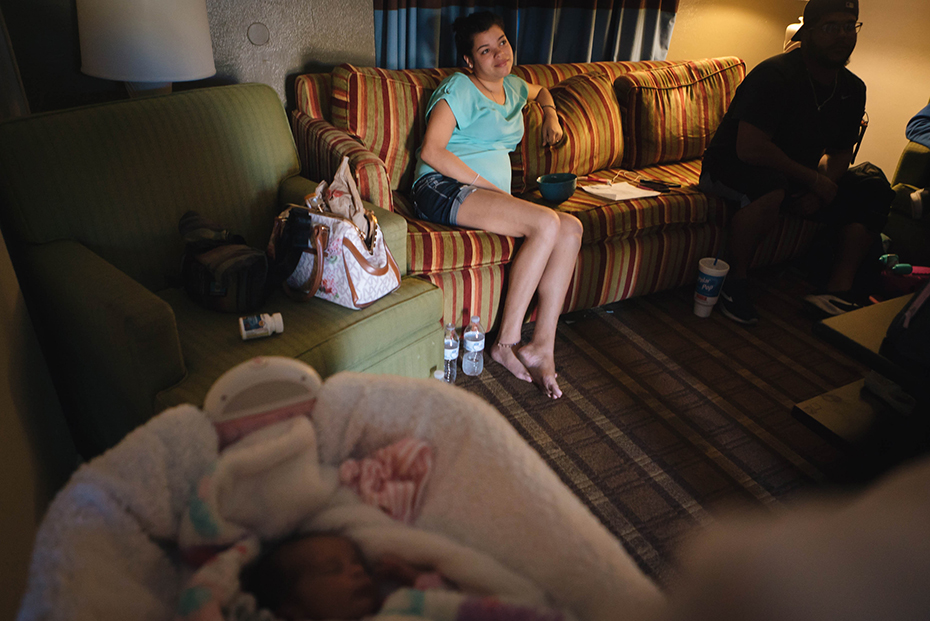
Chris Currie, director of emergency management issues at the US Government Accountability Office, said there are no rules barring FEMA from offering longer-term Direct Lease assistance in Florida.
“I don’t see anything in the guidance or statutes that restricts where they could purchase or lease units for direct housing assistance,” Currie said. “There is nothing that would just absolutely bar them from that.
“Whether they decide to use it — or it makes sense — is a whole other story.”
‘Hola! Tú eres Boricua?’
On a recent afternoon, Millie and a friend visited evacuee motels up and down US Highway 192 in Kissimmee. They wanted to raise awareness about a job fair and rally hosted by the group Vamos4PR, which, like the Hispanic Federation, Latino Leadership,Inc., and others, has been trying to help Puerto Rican evacuees in central Florida.
On one of the stops, she pulled into the Radisson parking lot and hollered out the window of her blue minivan: “Hola! Tú eres Boricua?” she asked. Are you Puerto Rican?
Yes, a young mother, Raysha Vargas, answered.
Her daughter, age 2, walked across a yellow speedbump in the hotel parking lot. The girl extended her arms to the left and right, like a gymnast teetering on a balance beam.
Are you on FEMA assistance?
Yes, the woman said. For now.